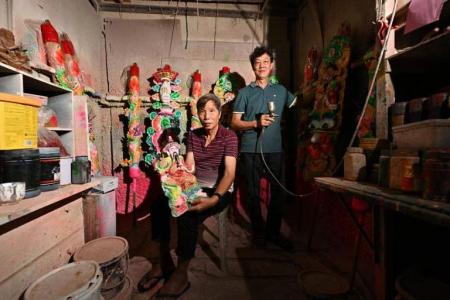Singapore’s last giant joss stick makers call it a day
After being lit up for close to a century, the incense will soon burn out at Singapore’s last giant joss stick maker Tay Guan Heng.
Owner and master artisan Albert Tay, 63, and his brother Steven, 66, have decided to end the 90-year-old business started by their grandfather in the 1930s. They said their workshop in Ang Mo Kio, the last one making giant joss sticks adorned with elaborate designs of dragons, deities and other Taoist symbols, will close on Dec 4.
Shaped and crafted from natural cinnamon wood clay, they are used during religious ceremonies as offerings. It takes several days to sculpt, design, spray paint and dry these joss sticks – and even longer during the rainy season. Making handcrafted joss sticks is a skill which was passed down from their grandfather to their father, and then to them.
During their heyday in the 1980s and 1990s, giant joss sticks could go up to a towering 5.5m to 6m. The implementation of the Environmental Public Health (Burning of Joss Sticks and Candles) regulations in 1998, which restricted the size and number of joss sticks that could be burnt, affected demand and profit margins, resulting in many exiting the trade.
Their last competitor, in Yishun, closed down in 2020 during the Covid-19 pandemic, when most of the Taoist ceremonies were cancelled.
“Age is catching up,” Mr Albert Tay said. “We feel the physical strain and mental stress of meeting seasonal demand.”
While sales are less than half from pre-Covid-19 days, last-minute orders pour in during the seventh, eighth and ninth lunar months when temples mark the Hungry Ghost Festival and deities’ birthdays. It is always a pressure to fulfill the orders and meet the tight deadlines, they said.
They had also diversified their business to make joss dough figurines of Taoist characters, animals and Singapore icons like samsui women. Unlike the joss sticks, these are cherished as keepsakes and not burnt.
In recent years, they started creating customised gingerbread houses and nativity sets for expatriate customers.
“I feel bad for my regular customers,” Mr Albert Tay added, his eyes tearing up a little. “But it’s just too much pressure for the two of us to keep the business going.”
As they do not employ any worker, the two have to do everything themselves, including delivering the joss sticks.
Their youngest brother Amos died of cancer at age 58 in 2019. A talented craftsman, he participated in cultural festivals and exhibitions, including the London Cultural Olympiad in 2014. He was in the shop till his last days, which had become his second home.
“If Amos was still around, the business would likely have continued,” said Mr Steven Tay.
The other six siblings helped out occasionally, but ventured into other fields after their father, who took over from the grandfather, died in 1998.


Mr Albert Tay and Mr Steven Tay have two children each and they have carved out successful careers for themselves.
Mr Albert Tay’s 29-year-old son Darren, who runs a tech company building apps, said the impending closure is a pity, but the business is taking a toll on his dad and uncle mentally and physically.
“Not everyone can do this well, and the paper-thin margins do not justify the labour-intensive work,” he added.
Though there are no competitors, customers are not willing to pay high prices for the joss sticks, which will be burned eventually, he said.
American expatriate housewife Jeanette Andersen is one of the regular customers who frequent the shop for treasured Christmas decorations. The 36-year-old is pregnant with her fifth child, and made a trip to the shop to get a gingerbread baby crafted for her youngest child, before it winds down.
“It is such a pity as they are so talented,” she said. “I am grateful that they rushed this out for me before their last day.”
Mr Albert Tay said he may still make small figurines from his Chai Chee home, but his brother Steven is looking forward to a well-deserved retirement. Those who wish to buy giant joss sticks will have to import less elaborate ones from Malaysia.


Looking around his shop, which is filled with the tools of his vanishing trade, Mr Albert Tay said with a sigh: “Almost all of these will be thrown away. We can keep only a few for memories’ sake.”
When contacted, the National Heritage Board (NHB) said it was interested in acquiring representative examples of joss sticks, moulds and figurines from the shop. NHB conducts research and documents traditional trades, and administers various schemes to promote, recognise and transform these trades.
Mr Alvin Tan, NHB’s deputy chief executive for policy and community, said this is a wake-up call and a timely call to action.
“While NHB can do our part, these trades must be willing to transform and find a sustainable business model, and the public must do its part to support them,” he added.
Tay Guan Heng will have a closing-down sale at Block 4001, Ang Mo Kio Avenue 10, #01-25, from 1pm to 4pm on Nov 19, 20, 26 and 27.
Get The New Paper on your phone with the free TNP app. Download from the Apple App Store or Google Play Store now


